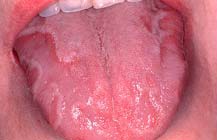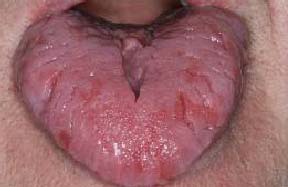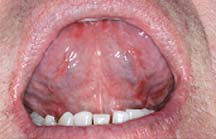Geographic Tongue
Geographic tongue (also known as benign migratory glossitis) is an inflammatory disorder that usually appears on the top and sides of the tongue.

Typically, affected tongues have a bald, red area of varying sizes that is surrounded, at least in part, by an irregular white border (see Right). The appearance of the affected portion of the tongue results from loss of the finger-like and mushroom shaped projections (papilla) which normally cover the tongue’s surface. Occasionally, similar appearing lesions occur on other oral sites, such as the palate, cheeks, under the tongue, or on the gums. Such lesions are known as geographic stomatitis or erythema migrans.
Above Left: This patient has a combination of both geographic and fissured tongue.
Above Right: In this patient, erythema migrans lesions developed underneath the tongue.
QUESTIONS AND ANSWERS ABOUT GEOGRAPHIC TONGUE
Q: What causes geographic tongue?
A: The cause of geographic tongue is unknown. Several factors have been proposed as possible causes such as emotional stress, psychological factors, habits, allergies, diabetes and hormonal disturbances. However, none of these factors have been conclusively linked to geographic tongue. A relationship between geographic tongue and psoriasis (a skin disease) has been reported. Geographic tongue was found to be more frequent in patients with psoriasis. Some consider geographic tongue an oral form of psoriasis.
Q: Who gets geographic tongue?
A: Geographic tongue is a fairly common condition. It can occur at any time in life, including childhood. It is estimated to affect from 1 - 2.5% of the population. In affected individuals geographic tongue tends to vary in color, shape and size --- hence the name of the condition. Multiple affected areas are commonly found. Lesions may also completely disappear for a period of time and then reappear. Geographic tongue and fissured tongue (Please see the PATIENT INFORMATION SHEET: Fissured Tongue) commonly occur together.
Q: Can people catch this from me?
A: Geographic tongue is not contagious and cannot be passed to anyone else.
Q: Is treatment necessary for geographic tongue?
A: Geographic tongue usually has no symptoms. In most cases, there is no need for treatment of this condition. Occasionally geographic tongue may cause a burning or smarting sensation of the tongue. In this situation, topical anesthetics can be used for surface numbing. Anti-inflammatory drugs (cortisonelike drugs) also may be prescribed to help control discomfort.
Q: Can geographic tongue turn to cancer?
A: No. There has not been any report regarding geographic tongue causing cancer. In most cases, a biopsy is not necessary to establish the diagnosis because of the identifiable clinical findings.
Prepared by L. Radfar and the AAOM Web Writing Group
Reviewed 13 May 2015
Japanese Translation - 日本語訳
Spanish Translation - Traducción Español
The information contained in this monograph is for educational purposes only. This information is not a substitute for professional medical advice, diagnosis, or treatment. If you have or suspect you may have a health concern, consult your professional health care provider. Reliance on any information provided in this monograph is solely at your own risk. |



